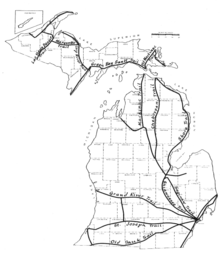Mackinac Trail
Mackinac Trail, or Mackinaw Trail is the name for two related, but separate, roadways in the US state of Michigan.
The trail is a historically important land route between the Straits of Mackinac and the rest of Michigan, both from the north and the south. The trail was first used by the tribes of Michigan, and surveyed between Saginaw and Mackinac in 1835, by Lieutenant Benjamin Poole of the 3rd U.S. Artillery.[1] The trail continues across the strait in the Upper Peninsula between St. Ignace and Sault Ste. Marie.

The name has also been used for roads in the northwestern Lower Peninsula.
Upper Peninsula
 US 2, previous designation of H-63, before the construction of the I-75 freeway
US 2, previous designation of H-63, before the construction of the I-75 freeway H-63, the entire road between St. Ignace and Sault Ste. Marie
H-63, the entire road between St. Ignace and Sault Ste. Marie
Lower Peninsula
In Saginaw, Mackinaw Street closely follows Poole's route in the general direction of present-day Midland until the western city limits, where Mackinaw Street twists north, becoming Mackinaw Road and following a section line into Bay County. Poole's route between Midland and Mackinac follows the Tittabawassee River north, crosses the Au Sable and Thunder Bay rivers, and reaches Lake Huron near present-day Cheboygan.[1]
Roads in the northwest Lower Peninsula that have been associated with the Mackinaw Trail:
 US 31, between Petoskey and I-75 south of Mackinaw City
US 31, between Petoskey and I-75 south of Mackinaw City US 131, between the Cadillac area and Petoskey
US 131, between the Cadillac area and Petoskey
See also
 Michigan Highways portal
Michigan Highways portal
References
- 1 2 Poole, Benjamin (1837). Survey of a Road Route from Saginaw to Mackinac (Map). Scale not given. Washington: Benjamin Poole. M.T. 25 Congress 2 Session, Doc. no. 234. Retrieved June 14, 2012 – via Michigan State University Map Library.